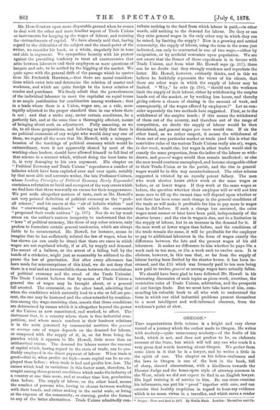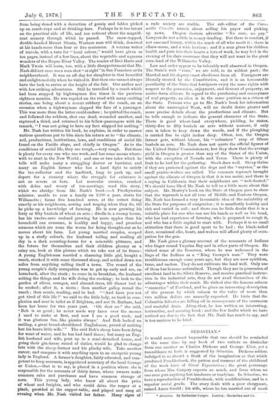OREGON.*
THIS unpretentious little volume is a bright and very clever record of a journey which the author made to Oregon. He writes with modesty—quite unnecessary modesty—of the faults of his book, which is not, and does not profess to be, an elaborate account of the State, but which will tell any one who reads it a very great deal worth knowing about Oregon. We gather from some hints in it that he is a lawyer, and he writes a little in the spirit of one. The chapter on his fellow-craftsmen and the laws in Oregon is one of the best in the book, full of sharp, shrewd observations, with a kindliness towards the Hoosier Judge and the home-spun style of attorney common in the West, which we did not expect to find in an English lawyer. His legal training is of service to him. He can cross-examine his informants, can put his " proof " together with care, and can exercise that healthy scepticism in regard to hear-say evidence which is no mean virtue in a traveller, and which saves a reader * Oregon : There and Back in 1877. By Wallis Nash. London : Macmillan and CO.
from being dosed with a decoction of gossip and fables picked up on coach-tops and at drinking-bars. Perhaps he is too intent on the practical side of life, and too reticent about the magnifi- cent scenery through which he passed. The snow-topped, double-headed Mount Shasta, Western men will think, deserved at his hands more than four or five sentences. A veteran writer of travels, with a turn for "local colour," would have given us ten pages, instead of a few lines, about the vegetable and aqueous wonders of the Rogue River Valley. The reader of Bret Harte and Mark Twain will learn, too, with a little disappointment that Mr. Nash did not once see a man shot" at sight" in San Francisco or its neighbourhood. It was an off-day for slaughter in that beautiful and enlightened city when he visited it. But then one cannot always have the luck to arrive at the height of the fair. Our author met with few striking adventures. Still he travelled by a coach which had been stopped by highwaymen five times in the previous eighteen months. He was regaled on the road with many exciting stories, one being about a recent robbery of the coach, on an occasion when a highwayman slapped the face of a passenger. This was more than the latter could endure ; he quitted the coach, and followed the robbers, shot one dead, wounded another, and captured a third, and returned to his fellow-passengers with the remark, "I was not going to have my face slapped for nothing."
Mr. Nash has written his book, he explains, in order to answer various questions put to him since his return as to "the climate, soil, productions, institutions, laws, and conditions of social life found on the Pacific slope, and chiefly in Oregon." As to the conditions of social life, they are rough,—very rough. But there is plenty for every one who can work, and has some means where- with to start in the New World ; and one or two tales which he tells will make many a struggling doctor or barrister, and many an English farmer who has a hard fight to satisfy the tax-collector and the landlord, long to pack up, and depart for a country where the struggle for existence is not so severe as here. Let muscular curates, crushed with debts and weary of tea-meetings, read this story, which we abridge from Mr. Nash's book :—A. Presbyterian minister, unable to rear a family on 1200 a year, starts for Willamette ; farms five hundred acres, at the outset doing exactly as his neighbours, sowing and reaping when they do, till he picks up a knowledge of farming. He is now growing his forty or fifty bushels of wheat an acre ; dwells in a roomy house, has his twelve-acre orchard growing far more apples than his household can consume, is healthy and happy, and preaches sermons which are none the worse for being thought-out as he moves about his farm. Let young married couples, cooped up in a stuffy suburb, the husband toiling and moiling all day in a dark counting-house for a miserable pittance, and the future for themselves and their children gloomy as a rainy sea, look at this picture which we take out of its frame : A young Englishman married a charming little girl, bought a ranch, stocked it with some thousand sheep, and settled down ten miles from anything calling itself a town. The round of the young couple's daily occupation was to get up early and see, on horseback, after the stock ; to come in to breakfast, the husband setting the things and the wife doing the cooking ; to look to the garden of olives, oranges, and almond-trees, till dinner had to be cooked ; after it, a siesta ; then another gallop round the ranch ; then music, reading, and to bed. "'And have you not got tired of this life ?' we said to the little lady, as fresh in com- plexion and neat in toilet as if Brighton, and not St. Barbara, had been her home for two years past. 'Oh dear no !' she said, 'Bob is so good ; he never made wry faces over the messes I used to make at first, and now I am a good cook, and it was glorious fun, like picnics always.' And Bob looked on smiling, a great broad-shouldered Englishman, proud of nothing but his brave little wife.'" The said Bob's sheep have been dying for want of water, and he has had hard times; but many an Eng- lish husband and wife, pent up in a semi-detached house, and going their gin-horse round of duties, would be glad to change lots with the sheep-farmer and his plucky wife. Take another career, and compare it with anything open to an energetic young lady in England. A farmer's daughter, fairly educated, and com- petent to keep accounts, is appointed secretary of the local Grange or Union,—that is to say, is placed in a position where she is responsible for the accounts of thirty farms, whose owners make common sales and purchases and have common storage of corn. This young lady, who knew all about the price of wheat and freights, and who could drive the reaper at a pinch, presided at the supper-table, and played and sang all evening when Mr. Nash visited her father. Many signs of a rude society are visible. The sub-editor of the Corn- wallis Crucible travels about selling his paper and picking up news. Oregon doctors advertise "No cure, no pay." Lawyers do not a little in money-lending. But there is comfort, if not ease and luxury, within the reach of all who merit it ; there is elbow-room, and a wide horizon ; and if a man gives his children health and puts into their hearts a love of work, he may feel in the evening of his days assurance that they will not want in the great corn-land of the Willamette Valley.
Law and order appear to be tolerably well observed in Oregon. The State's writ "runs," we are told, in its wildest part ; the Marshal and his deputy exact obedience from all. Foreigners are liberally treated by the Constitution, and it is an honourable peculiarity of the State that foreigners enjoy the same rights with respect to the possession, enjoyment, and descent of property, as native-born citizens. In regard to the purchasing and conveyance of real property, an alien is in the same position as a citizen of the State. Persons who go to Mr. Nash's book for information about the unoccupied West, will no doubt desire greater and more precise details about the productions and climate. But he tells enough to indicate the general character of the State. There is good wheat-land everywhere, yielding, he states, thirty-five to fifty bushels an acre without manure, if only care is taken to keep down the weeds, and if the ploughing is carried five to eight inches deep. Often, too, the Oregon farmer gets, without labour, his " volunteer " crop of fifteen bushels an acre. Mr. Nash does not quote the official figures of the United States' Commissioners, but they show that the average yield in Oregon is greater than any of the States of the Union, with the exception of Nevada and Texas. There is plenty of fruit to be had for the gathering. Stock does well. Sheep thrive if they are protected against the dogs and the " cayotes," as the small prairie-wolves are called. The common reproach brought against the climate of Oregon is that it is too moist, and there is a saying in California that their neighbours are "web-footed." We should have liked Mr. Nash to tell us a little more about this subject. Mr. Mosley's book on the State of Oregon goes to show that the reproach is not all true of Middle and Eastern Oregon. Mr. Nash has formed a very favourable idea of the suitability of the State for purposes of emigration ; it is manifestly healthy and rich and varied in soil ; and there can be little doubt that it is a suitable place for one who can use his hands as well as his head, who has had experience of farming, who is prepared to rough it, and who has a little capital to start with. Perhaps it is no small attraction that there is good sport to be had ; the black-tailed deer, occasional elks, bears, and wolves will afford plenty of occu- pation for the gun.
Mr. Nash gives a gloomy account of the remnants of Indians who linger round Yaquina Bay and in other parts of Oregon. Ile visited some of the Reserves, where he was welcomed in the lingo of the Indians as a "King George's man." They were troublesome enough some years ago, but they are now spiritless, tame, and useless. They do not cultivate the land well. Only one of them has become naturalised. Though they are in possession of excellent land in the Siletz Reserve, and receive practical instruc- tion in the industrial arts, they do not avail themselves of the advantages within their reach. Ile visited also the famous salmon "canneries" of Portland, and he gives an interesting description of the process by which salmon to the value of more than two million dollars are annually exported. Ile hints that the- Columbia fisheries are falling off in consequence of the enormous and wasteful drain. Altogether, he has written an interesting, instructive, and amusing book ; and the few faults which we have noticed are due to the fact that Mr. Nash has much to say, and is too anxious to be brief.



































 Previous page
Previous page